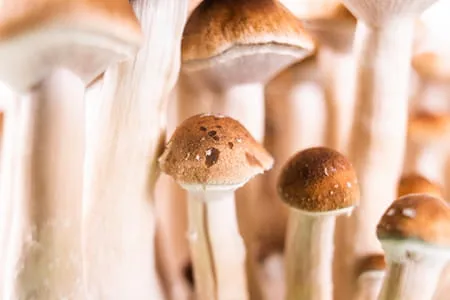April 22, 2025

A groundbreaking study led by researchers from Denver Health's Rocky Mountain Poison & Drug Safety division, with co-authors from the Substance Abuse and Mental Health Services Administration (SAMHSA), reveals a sharp increase in psilocybin, or “magic mushrooms,” use across the United States, with implications for public health monitoring and policy.
Published in the Annals of Internal Medicine, the study titled "The Rise of Psilocybin Use in the United States, a Multi-Source Observational Study," is the first to comprehensively examine psilocybin use trends using five nationally representative datasets from 2014-2023.
Key findings of the study include:
- The number of adults who have tried psilocybin increased from 25 million (10% of US adults) in 2019 to 31.3 million (12.1%) in 2023. This was second only to cannabis use, higher than opioids and methamphetamine.
- Past-Year Psilocybin use among U.S. 12th graders was 53% higher in 2023 than 2019.
- Past-year use increased by 44% in young adults (18–29) and by 188% in older adults (30+).
- Individuals with moderate to severe depression, anxiety or chronic pain were significantly more likely to report use of psilocybin.
- Psilocybin-related poison center exposure calls rose dramatically: 201% in adults, 317% in adolescents and 723% in children under 12 years between 2019 and 2023.
Despite the rise in exposure cases, the research team found a discrepancy: the significant number of poison center reports was not mirrored in national emergency department records, which relied on ICD-10 coding. From 2015 to 2021, only three psilocybin poisonings were documented in ED and outpatient facilities, highlighting a critical gap in public health surveillance.
“This mismatch in data tells us, that until now, we’ve lacked visibility into the real-world health impacts of psilocybin use,” said Joshua C. Black, PhD, co-lead author and senior scientist at Rocky Mountain Poison & Drug Safety at Denver Health. “Without accurate coding and comprehensive surveillance systems, health systems and policymakers are missing key information needed to support and inform the public.”
The study calls for investment in better systems to track psilocybin use and health outcomes, especially as states begin to regulate its use. It calls on health care professionals and policymakers to enhance ICD-10 coding practices, expand evidence-based education on dosing and risks, and implement targeted interventions for individuals with co-occurring mental health or chronic pain conditions.
“Psilocybin has entered the mainstream, and we’re seeing sharp increases in use among adolescents and adults navigating mental health and chronic pain challenges,” said Karilynn M. Rockhill, PhD, co-lead author of the study and assistant scientist at Rocky Mountain Poison & Drug Safety. “These results underscore a turning point in public health awareness and the need to respond with informed, compassionate and data-driven strategies.”
This multi-institutional study was led by researchers from Rocky Mountain Poison & Drug Safety at Denver Health and Hospital Authority, the Substance Abuse and Mental Health Services Administration (SAMHSA), and the Commissioned Corps of the U.S. Public Health Service. Data was used from the National Poison Data System (NPDS), the Survey of Non-Medical Use of Prescription Drugs (NMURx), the National Survey on Drug Use and Health (NSDUH), Monitoring the Future (MTF), and the National Hospital Ambulatory Medical Care Survey (NHAMCS).
Drawing on these datasets, the research team conducted the most comprehensive analysis to date of psilocybin use trends in the U.S. Rocky Mountain Poison & Drug Safety also runs the National Survey Investigating Hallucinogen Trends which measures the benefits, risks, and outcomes associated with psilocybin and other psychedelic drug use.

